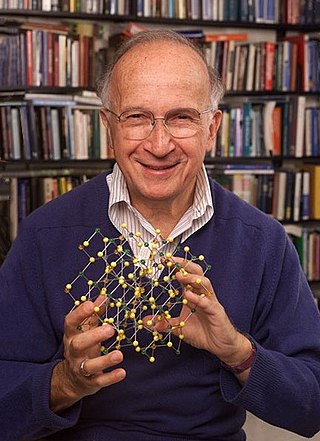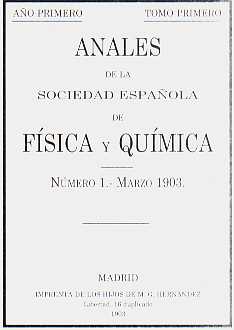
Roald Hoffmann is a Polish-American theoretical chemist who won the 1981 Nobel Prize in Chemistry. He has also published plays and poetry. He is the Frank H. T. Rhodes Professor of Humane Letters Emeritus at Cornell University.
An inorganic compound is typically a chemical compound that lacks carbon–hydrogen bonds—that is, a compound that is not an organic compound. The study of inorganic compounds is a subfield of chemistry known as inorganic chemistry.

The American Chemical Society (ACS) is a scientific society based in the United States that supports scientific inquiry in the field of chemistry. Founded in 1876 at New York University, the ACS currently has more than 155,000 members at all degree levels and in all fields of chemistry, chemical engineering, and related fields. It is one of the world's largest scientific societies by membership. The ACS is a 501(c)(3) non-profit organization and holds a congressional charter under Title 36 of the United States Code. Its headquarters are located in Washington, D.C., and it has a large concentration of staff in Columbus, Ohio.
The Journal of the Chemical Society was a scientific journal established by the Chemical Society in 1849 as the Quarterly Journal of the Chemical Society. The first editor was Edmund Ronalds. The journal underwent several renamings, splits, and mergers throughout its history. In 1980, the Chemical Society merged with several other organizations into the Royal Society of Chemistry. The journal's continuity is found in Chemical Communications, Dalton Transactions, Faraday Transactions, and Perkin Transactions, all of which are published by the Royal Society of Chemistry.
Chemical nomenclature is a set of rules to generate systematic names for chemical compounds. The nomenclature used most frequently worldwide is the one created and developed by the International Union of Pure and Applied Chemistry (IUPAC).
Organometallics is a biweekly journal published by the American Chemical Society. Its area of focus is organometallic and organometalloid chemistry. This peer-reviewed journal has an impact factor of 3.837 as reported by the 2021 Journal Citation Reports by Thomson Reuters.
Gazzetta Chimica Italiana was an Italian peer-reviewed scientific journal in chemistry. It was established in 1871 by the Italian Chemical Society, but in 1998 publication ceased and it was merged with some other European chemistry-related journals, to form the European Journal of Organic Chemistry and the European Journal of Inorganic Chemistry.
The Recueil des Travaux Chimiques des Pays-Bas was the Dutch scientific journal for chemistry. It was established in 1882, but from 1897 to 1919 it was published under the title Recueil des Travaux Chimiques des Pays-Bas et de la Belgique. From 1980 to 1984, the journal was published under the title Recueil: Journal of the Royal Netherlands Chemical Society, but in 1985, the title changed back to the original one. In 1997, the journal merged with Chemische Berichte and Liebigs Annalen to form Chemische Berichte/Recueil and Liebigs Annalen/Recueil, respectively.
Reaxys is a web-based tool for the retrieval of information about chemical compounds and data from published literature, including journals and patents. The information includes chemical compounds, chemical reactions, chemical properties, related bibliographic data, substance data with synthesis planning information, as well as experimental procedures from selected journals and patents. It is licensed by Elsevier.

The German Chemical Society is a learned society and professional association founded in 1949 to represent the interests of German chemists in local, national and international contexts. GDCh "brings together people working in chemistry and the molecular sciences and supports their striving for positive, sustainable scientific advance – for the good of humankind and the environment, and a future worth living for."
The International Union of Pure and Applied Chemistry (IUPAC) publishes many books which contain its complete list of definitions. The definitions are divided initially into seven IUPAC Colour Books: Gold, Green, Blue, Purple, Orange, White, and Red. There is also an eighth book, the "Silver Book".

The Spanish Royal Society of Chemistry (RSEQ) is a Spanish scientific society dedicated to the development and dissemination of chemistry, in its aspect of pure science and in its applications. It originated in 1980 after the split of the Spanish Royal Society of Physics and Chemistry which itself was founded in 1903.
The Danish Chemical Society was founded in 1879. The nonprofit organization aims to advance the chemical sciences in Denmark.

The Polish Chemical Society is a professional learned society of Polish chemists founded in 1919 to represent the interests of Polish chemists on the local, national and international levels.
The Italian Chemical Society is the national association in Italy representing the chemical sciences. Its main aim is to promote and support the development of chemistry and scientific research, spreading the knowledge of chemistry and its applications in order to improve the welfare of the country, establishing and maintaining relations with organizations from other countries with similar purposes and promoting the study of this subject at school and university.

Chemistry Europe is an organization of 16 chemical societies from 15 European countries, representing over 75,000 chemists. It publishes a family of academic chemistry journals, covering a broad range of disciplines.
The Association of Greek Chemists is the chemical society of Greek chemists. The Association of Greek Chemists is a public legal entity that reports to the Ministry of Industry, Energy and Technology.
Partha Sarathi Mukherjee is an Indian inorganic chemist and a professor at the Inorganic and Physical Chemistry department of the Indian Institute of Science. He is known for his studies on organic nano structures, molecular sensors and catalysis in nanocages. He is a recipient of the Swarnajayanthi Fellowship of the Department of Science and Technology and the Bronze Medal of the Chemical Research Society of India. The Council of Scientific and Industrial Research, the apex agency of the Government of India for scientific research, awarded him the Shanti Swarup Bhatnagar Prize for Science and Technology, one of the highest Indian science awards, in 2016, for his contributions to chemical sciences.





